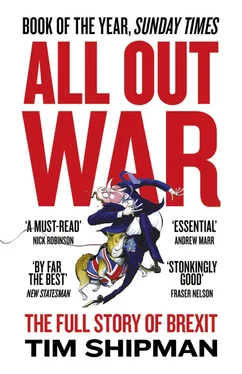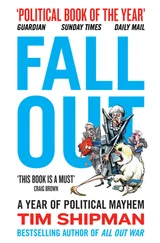Tim Shipman - All Out War - The Full Story of How Brexit Sank Britain’s Political Class
Здесь есть возможность читать онлайн «Tim Shipman - All Out War - The Full Story of How Brexit Sank Britain’s Political Class» — ознакомительный отрывок электронной книги совершенно бесплатно, а после прочтения отрывка купить полную версию. В некоторых случаях можно слушать аудио, скачать через торрент в формате fb2 и присутствует краткое содержание. Жанр: unrecognised, на английском языке. Описание произведения, (предисловие) а так же отзывы посетителей доступны на портале библиотеки ЛибКат.
- Название:All Out War: The Full Story of How Brexit Sank Britain’s Political Class
- Автор:
- Жанр:
- Год:неизвестен
- ISBN:нет данных
- Рейтинг книги:3 / 5. Голосов: 1
-
Избранное:Добавить в избранное
- Отзывы:
-
Ваша оценка:
- 60
- 1
- 2
- 3
- 4
- 5
All Out War: The Full Story of How Brexit Sank Britain’s Political Class: краткое содержание, описание и аннотация
Предлагаем к чтению аннотацию, описание, краткое содержание или предисловие (зависит от того, что написал сам автор книги «All Out War: The Full Story of How Brexit Sank Britain’s Political Class»). Если вы не нашли необходимую информацию о книге — напишите в комментариях, мы постараемся отыскать её.
All Out War: The Full Story of How Brexit Sank Britain’s Political Class — читать онлайн ознакомительный отрывок
Ниже представлен текст книги, разбитый по страницам. Система сохранения места последней прочитанной страницы, позволяет с удобством читать онлайн бесплатно книгу «All Out War: The Full Story of How Brexit Sank Britain’s Political Class», без необходимости каждый раз заново искать на чём Вы остановились. Поставьте закладку, и сможете в любой момент перейти на страницу, на которой закончили чтение.
Интервал:
Закладка:
What followed was the most remarkable moment in British politics since May 1940, when Neville Chamberlain was ousted at the point of the nation’s greatest ever peril and replaced by Winston Churchill, its maverick saviour. For a moment it looked as if Churchill’s biographer, the Brexit cheerleader Boris Johnson, would inherit the crown as his hero had done seventy-six years earlier. But in the fashion of previous revolutions the revolutionary leadership began to consume themselves. Driven by admirers who believed him the most significant Conservative thinker of his generation, and the dawning realisation in his own head that he could do the job himself, Michael Gove plunged the knife. He plunged it so hard and so deep that he wounded himself and left Johnson, once more, the recipient of a nation’s good wishes. They were not the first victors in war who conspired to lose the peace.
It all now seems so inevitable. Britain had always been sceptical about Europe; it was now just expressing a historic feeling. Yet through it all, one fact screams loudest above all. Had just 600,000 people changed their vote, David Cameron would be hailed as the political escapologist of his generation. This book would be – even more than it is – about the mistakes and infighting of the Leave campaigns. Cameron would have been able to depart at a time and in the manner of his own choosing.
When the country voted Leave, the political class took it rather more literally than perhaps even some Brexiteers expected. Of the main parties’ leaders who went into the 2015 election – Cameron, Miliband, Clegg and Farage – not one remains. Of the six cabinet-level supporters who signed the Vote Leave pledge the morning after Cameron’s deal in Brussels, only Chris Grayling and Priti Patel still have cabinet jobs – and in January 2016 Grayling looked the one least likely to keep his post. Of the four dominant modernising Tories of the last decade – Cameron, Osborne, Gove and Johnson – only one remains at the apex of politics, and even that was a close-run thing. Boris Johnson went from a popular campaign hero, to startled whipping-boy of the furious 48 per cent, to prime minister in waiting, to political oblivion, and then back to one of the four great offices of state, all in the space of a fortnight. Theresa May went from submariner during the campaign to the captain of the ship at its conclusion, then promptly consigned the ruling class of the Conservative Party to the backbenches, and the austerity economics that had dominated political discourse for six years to the dustbin of history.
These were events populated by a cast of characters who might have been created by Wodehouse or Trollope. In these pages you will find a championship-winning basketball player, an adventurer who smuggled himself into rebel-held Benghazi, a millionaire owner of assault weapons, a scholar of Bismarck who idolises James Carville – and more MPs and aides than is healthy who learned their trade from reading classic volumes of military strategy.
I’m not a sociologist or a political scientist. This is not a study of the decline of the post-industrial working class, ‘post-truth’ politics or the psychology of anger. You won’t find a detailed psephological breakdown of which streets backed Brexit in Sunderland. It is not the story of the little guy, the canvassers and doorknockers who man a campaign. If this book in any way goes beyond journalism – and I make no such claims – it is unashamedly elitist history. It is a book about leaders and their closest aides, the decisions they make, how and why they make them, and how they feel when they turn out to be wrong. It is about dilemmas faced and confronted. It is about the battle between self and team. It is about principle and ambition, and how the two are sometimes so indivisible as to make divining motive pointless. It is about men who make decisions that are intellectually consistent and – by their own measure – morally sound, but which are simultaneously disastrous for themselves and those closest to them. It is about how doing what worked before doesn’t always work again. Most of all it is about asking the question: how far are you prepared to go to win? Politics is a results business. There are no hung Parliaments in referendums, only victory or total, irreversible defeat.
There is a good case that four decades of Euroscepticism, coupled with the eurozone crisis and the mass migration from the Middle East, were more important than what happened during the campaign in determining the result. But this is a book that begins from the premise that the actions of key individuals, at hinge moments in history, are magnified out of all proportion. For the thirteen months between the general election and polling day, what David Cameron, George Osborne, Michael Gove, Boris Johnson, Nigel Farage, Arron Banks and Dominic Cummings thought and did decided the fate of the rest of us.
Two points of style and taste.
Anyone who has watched The Thick of It – the television comedy which is viewed by some in Westminster as an instruction manual rather than a satire – will know that British politics can be a profane business. Many MPs and their aides swear like troopers, and the rhythms of their speech often require expletival emphasis. I have censored these efforts where the profanity is simply used as punctuation – not least because the spin doctors from both main campaigns asked me to spare their mothers’ blushes – but where it is essential to the emotion of the sentence I have left it in. Be warned.
Secondly, throughout the book I have ignored the prefix ‘Lord’ for political peers. This is not a pointed comment about the honours system, but I know of no one in Westminster who refers to Peter Mandelson, Rodney Leach or David Sainsbury as Lord This, That or the Other. So, if he will forgive me, outside the acknowledgements the Baron Mandelson of Foy in the County of Herefordshire and of Hartlepool in the County of Durham will be plain old Peter in these pages.
Those looking for a clear delineation of good guys and bad guys have come to the wrong place. I am not here to explore the rights and wrongs of Brexit, or to pass judgement on the questionable claims of the campaigns, but to explain why both sides used them. I hope that by the end, if you think it was moral to support Remain, perhaps you will appreciate that there was also a certain nobility on the Leave side, in doing everything possible to win a battle they regarded as existentially important. If you felt it was moral to vote to Leave, perhaps you will agree that the intensity with which David Cameron and George Osborne fought the campaign was proof of their passion and belief, not of the widespread view that all politicians are lying bastards who will say or do anything to hang on to power.
PART ONE
SKIRMISHES
FROM BLOOMBERG TO BRUSSELS
October 2011 to February 2016
1
‘My Lily-Livered Colleagues …’
It says much about David Cameron’s relationship with George Osborne that they kept a lid on it. The decision to hold a referendum on Britain’s membership of the European Union was the most important Cameron made as prime minister – and his closest political ally, friend and adviser opposed it. Not just a little bit, but profoundly and wholeheartedly – and yet the disagreement did not leak.
It was late May 2012, and Cameron was just back from a NATO summit in Chicago. In a pizza restaurant at O’Hare Airport on the way home he had called a council of war with Ed Llewellyn and William Hague, his chief of staff and his foreign secretary, and decided he had no choice but to go into the 2015 general election with a pledge to hold a nationwide vote on the UK’s relationship with the EU by the middle of the next Parliament. 1Just before he became prime minister, Cameron had remarked, ‘I don’t want Europe to define my premiership.’2 He had already discovered that was a forlorn hope.
Читать дальшеИнтервал:
Закладка:
Похожие книги на «All Out War: The Full Story of How Brexit Sank Britain’s Political Class»
Представляем Вашему вниманию похожие книги на «All Out War: The Full Story of How Brexit Sank Britain’s Political Class» списком для выбора. Мы отобрали схожую по названию и смыслу литературу в надежде предоставить читателям больше вариантов отыскать новые, интересные, ещё непрочитанные произведения.
Обсуждение, отзывы о книге «All Out War: The Full Story of How Brexit Sank Britain’s Political Class» и просто собственные мнения читателей. Оставьте ваши комментарии, напишите, что Вы думаете о произведении, его смысле или главных героях. Укажите что конкретно понравилось, а что нет, и почему Вы так считаете.












